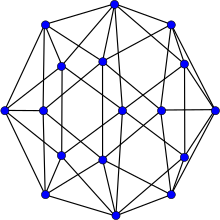Errera graph
| Errera graph | |
|---|---|

The Errera graph
|
|
| Named after | Alfred Errera |
| Vertices | 17 |
| Edges | 45 |
| Radius | 3 |
| Diameter | 4 |
| Girth | 3 |
| Automorphisms | 20 (D10) |
| Chromatic number | 4 |
| Chromatic index | 6 |
| Properties |
Planar Hamiltonian |
In the mathematical field of graph theory, the Errera graph is a graph with 17 vertices and 45 edges. Alfred Errera published it in 1921 as a counterexample to Kempe's erroneous proof of the four color theorem; it was named after Errera by Hutchinson & Wagon (1998).
The Errera graph is planar and has chromatic number 4, chromatic index 6, radius 3, diameter 4 and girth 3. All its vertices are of degree 5 or 6 and it is a 5-vertex-connected graph and a 5-edge-connected graph.
The Errera graph is not a vertex-transitive graph and its full automorphism group is isomorphic to the dihedral group of order 20, the group of symmetries of a decagon, including both rotations and reflections.
The characteristic polynomial of the Errera graph is .
...
Wikipedia

